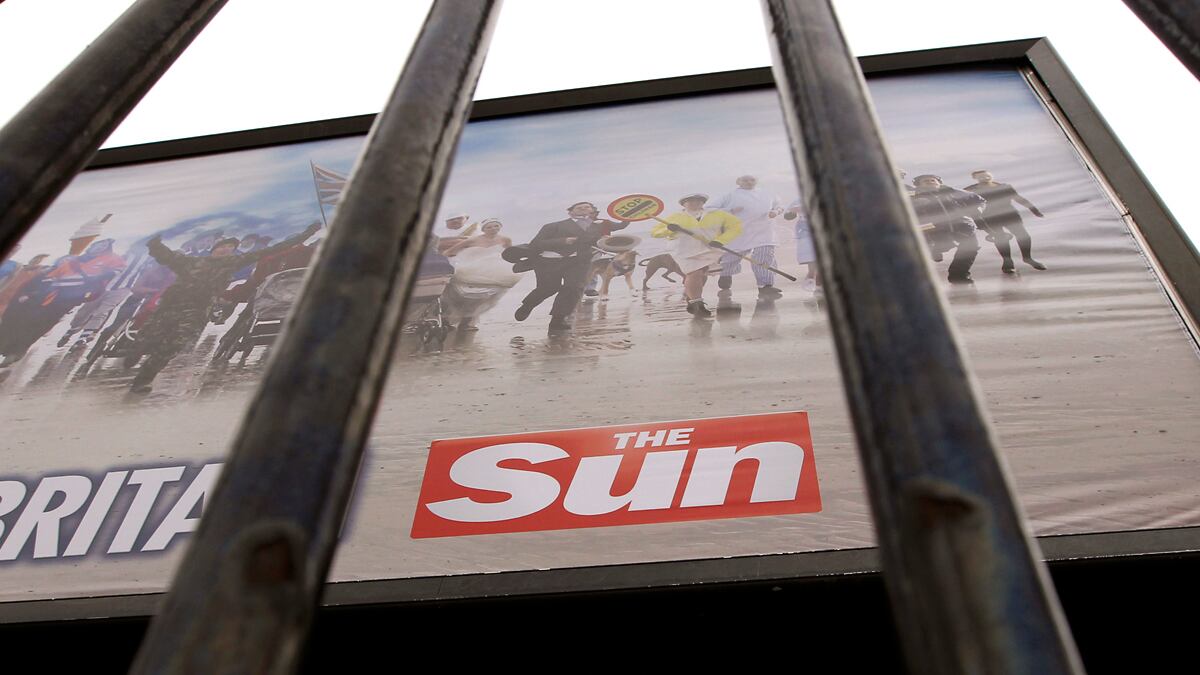Rupert Murdoch is on his way back to London to deal with a new crisis in his tabloid empire.
This morning five employees from the Murdoch-owned News International’s flagship tabloid, The Sun, were arrested as part of an ongoing investigation into corrupt journalistic practices unearthed by the phone-hacking scandal that toppled The Sun’s sister tabloid News of the World last summer. The inquiry, termed Operation Elveden, is pursuing evidence that journalists from News International papers may have illegally bribed police officials for information.
The Sun’s editor, Dominic Mohan, said he was “shocked” by the arrests, which targeted the paper’s chief crime reporter, John Kay, chief foreign correspondent Nick Parker, deputy news editor John Sturgis, deputy editor Geoff Webster, and picture editor John Edwards. One police officer was also arrested, as well as a Defense Ministry official and a member of the Armed Forces—which indicates that the investigation is expanding to look at “public officials who are not police officers,” according to a statement from detectives. Police officers searched the homes of those people arrested, as well as the News International offices in London. As of press time, all of the arrestees had been bailed out and no charges had been announced—which means the journalists could be back at work soon. “Our focus is putting out Monday’s newspaper,” said Mohan today.
Today’s arrests come two weeks after four high-ranking former and current Sun journalists were interrogated by Scotland Yard and released on bail. After that incident, News International issued a statement announcing that it had commissioned its own committee to “undertake a review of all News International titles, regardless of cost, and to proactively cooperate with law enforcement and other authorities”—indicating that the company itself had provided the police with information leading to the arrests. One News International employee previously said the company was “draining the swamp” in order to stanch the bleeding from the phone-hacking crisis.

Even so, the drama has compelled Rupert Murdoch to plan to return to London, as he did at the height of the phone-hacking crisis last summer, presumably to reassure his employees and shareholders that The Sun will survive. In an internal memo to employees today, News International CEO Tom Mockridge told a worried staff: “You should know that I have had a personal assurance today from Rupert Murdoch about his total commitment to continue to own and publish The Sun newspaper. Today we are facing our greatest challenge.” Murdoch is expected to visit his London staff near the end of next week.
The Sun, with a circulation of more than 2 million, has the highest readership of any daily newspaper in Britain, and is believed to help subsidize News International’s money-losing broadsheet, The Times of London. While the loss of News of the World was drastic enough for Murdoch’s company, the newspaper published only on Sundays. If The Sun were to close, “the presses would be idle,” notes Brian Cathcart, a journalism professor and activist with the Hacked Off campaign. Signs of frustration within the Murdoch empire surfaced on Twitter today, with Sean O’Neill, the crime editor for The Times, lamenting, “Soon we won’t have a press at all.”
But for the time being, it seems unlikely that The Sun would meet the same fate as News of the World. There has been no public outcry over the police bribery investigation nor reported pressure from advertisers or shareholders, all factors that combined to help shutter News of the World. And many observers have lauded the new proactive moves by News International to cooperate with the police investigation, even though the country’s national journalism union has complained that Sun journalists are being “thrown to the wolves” in “a witch-hunt.”
Still, Murdoch and News International are not in the clear. Tom Watson—the M.P. who has been leading the charge against News International in Parliament and who was instrumental in ferreting out the phone-hacking cover-up—took to the airwaves today to suggest that Murdoch and other officials could be called before Parliament to answer for the new arrests. Meanwhile, the Leveson Inquiry, which is investigating the depths of the phone-hacking scandal, plans to open a new and potentially incendiary session next month that will focus exclusively on the possibly corrupt relationship between British journalists and police. “Today’s developments show this is no longer only about phone hacking,” Watson said after the arrests. “It goes to the very heart of corporate governance of the company led by Rupert Murdoch.”





